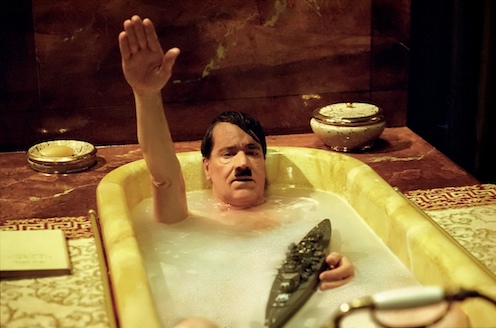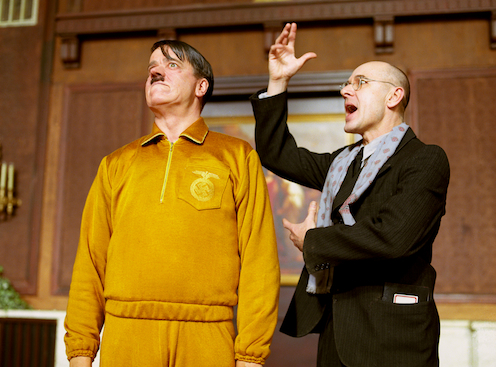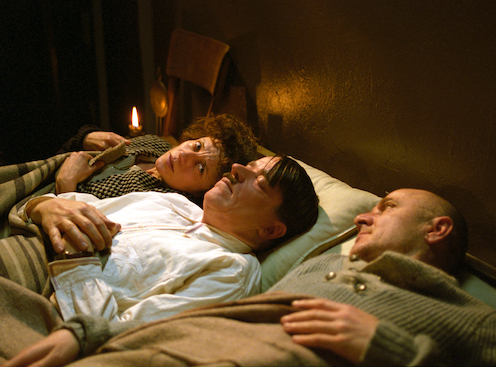My Fuehrer: The Truly Truest Truth About Adolf Hitler
Full Description
Admit it: you’ve giggled at Hogan’s Heroes and tapped your toes along with Mel Brooks’s “Springtime for Hitler.” After all, when Americans—especially American Jews—poke fun at Nazis, it comes with the presumption, “we fought, we won, we earned our right to ridicule.” But Germans can’t go there; it’s verboten.
Now Dani Levy’s gleefully wicked and controversial parody My Fuehrer challenges this long-held taboo. Everything about the premise is pointedly outrageous:
It is late 1944. The armies of the Third Reich are in retreat and the empire is crumbling. A depressed and whining Adolf Hitler (Helge Schneider) seems incapable of delivering an important inspirational speech, so his former acting teacher, Adolf Gruenbaum (Ulrich Mühe), a Jew, is released from a concentration camp to help Hitler reclaim his charisma.
Gruenbaum’s sudden access to the Fuehrer is rich turf for staging comic revenge fantasies (Hitler must bark like a dog and parade through the chancellery in a jogging suit), and Levy delights in satirizing the craze for Hitler psychobiography (his harsh father and childhood bed-wetting come up as issues).
Because Levy is a Swiss-born Jew, he may get a free pass for poking a stick in a Nazi’s eye; but he has cast and produced the film in Germany as a deliberate provocation, a puncture in the German balloon of political correctness around its Nazi past. And as in Chaplin’s The Great Dictator, there is more going on here than mere ridicule. When Gruenbaum and his wife have the chance to do away with the Fuehrer, Levy seems to ask his German public, “What would you do?” And by extension, he is asking us as well.
Filmmaker Bio(s)
Dani Levy was born in Basel in 1957, and has lived in Berlin since 1980. After spending a wild childhood and youth as circus clown, acrobat and guitarist in a rock band and with a mediocre (so he claims) high school diploma in hand, Levy worked in theater in Basel (1977-79) and Berlin (1980-83), before making his debut film DU MICH AUCH (Same to You, 1986), for which he won the prize for Best Film at the International Comedy Festival in Veyey. He received further awards for his 1988 film ROBBYKALLEPAUL (Audience Award at the 1989 Max Ophuls Festival) and his 1991 feature I WAS ON MARS (FIPRESCI Special Distinction as Best Film at San Sebastian).
In 1993, Levy won the Hypobank Director’s Prize at the Munich Film Festival with his WDR-commissioned short film OHNE MICH (1993), which launched a spate of movies against the resurgence of right-wing radicalism in Germany. A year later, together with Stefan Arndt, Wolfgang Becker and Tom Tykwer, Levy founded the production company X Filme Creative Pool. STILLE NACHT (1995), the first film made under the aegis of X Filme, ran in the International Competition of the 1996 Berlin Film Festival.
In 1997, after ten years of work on the script and development, Levy devoted himself to making a film that was very close to his heart: MESCHUGGE (The Giraffe). This complex thriller premiered in 1998 at the Toronto Film Festival. In 1999 MESCHUGGE was awarded, along with LOLA RENNET (Run Lola Run), the Bavarian Film Prize and the Award for Best Cinematography. The same year, commissioned by the automotive industry flagship city of Wolfsburg, Levy shot the first 360-degree feature film. DAS GEHEIMNIS DER SICHERHEIT, on location in Iceland and Munich.
In spring of 2001. Levy made his first video for the song "Adriano -- Letzte Warnung" performed by the Brother Keepers, a collaborative group of 14 Afro-German musicians (including Xavier Naidoo, Samy Deluxe, Tyron Ricketts and Sekou). The music video went on to become one of the most-played clips for 2001 on both VIVA and MTV. With his 2002 family drama VATER (I’m the Father), Levy painted a highly topical and vivid portrait of an ambitious generation that is forever at risk of coming to grief over its own aspirations.
In September of 2004, Dani Levy’s street theater piece "Freie Sicht aufs Mittelmeer" had its successful premiere. Commissioned by Theater Basel, the filmmaker staged a tour of his hometown in the form of a story of two unequal brothers, set against the background of left-wing culture and political unrest in Basel in the eighties and nineties.
Director(s)
Country(ies)
Language(s)
w/English Subtitle
Release Year
Festival Year(s)
Running Time
89
Cast



